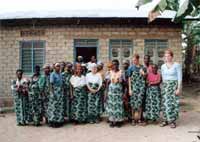The preschool is located in the Kitahya village. Kitahya and surrounding villages, where the pupils and members of UWAKIKI live, belong to Ward Nyakibimbili in the Kagera Region.
This Region is mostly populated by 'Haya' people, a very hospitable tribe living from the cultivation of coffee. Due to the worldwide drop of the price for coffee, Tanzania’s economy has broken down. In combination with the war against Uganda, this has left its mark in and around Bukoba, the region’s capital. The income of most inhabitants has been decreasing continuously because of high inflation, natural catastrophes, and other unpredictable strikes, such as wars and civil wars in the neighbouring countries of Uganda and Rwanda. According to current Worldbank statistics, the gross national product per year and per capita is 330 US-$.
Origins

UWAKIKI (an abbreviation for Umoja wa wanawake wa kijiji cha Kitahya, which stands for Womengroup of the Village Kitahya) was founded and registered as a non-governmental organisation (NGO) in 1996. It is situated in the northwest of Tanzania, close to Lake Victoria.
Mainly initiated by housewives and mothers of the village Kitahya, UWAKIKI has already been active since 1986, when a growing number of HIV orphans, and old, sick and abandoned people could no longer live and function independently in the village.
The health situation is especially critical in the Kagera Region: about 40% of the inhabitants (mostly young and otherwise healthy people) are HIV-positive, which is the highest rate in Tanzania. Most people can neither afford staying at a hospital nor paying for medicine or even transport to a hospital. In addition, the free state health service was replaced by a network of private hospitals. Frequently diagnosed diseases include malaria, cholera, polio and malnutrition. Besides that, the lack of clean water is a major health risk.
HIV/AIDS
According to a projection by USAID, there will be 4.2 million orphans who have lost their parents to HIV/AIDS in Tanzania in 2010. This means that every third child in Tanzania will be an orphan: You already see this in the schools in Kagera where one-fifth to one-third of the children have lost one or both of their parents.
Of course, there is no one typical orphan scenario, as the consequences depend on the social environment; however, there are a number of similar problems that arise and must be dealt with in dialogues about the orphans.
The death of the father has material consequences, first and foremost. For example, continued attendance of school comes into question, as pupils must pay for tuition and mandatory uniforms. There is less or no money available to buy clothing and food. The children must take on new responsibilities, such as working in the fields or helping at home. Sometimes the father’s family seizes the farm and home, and sends the mother away. The children are then divided amongst relatives, and are viewed as additional empty mouths to feed and a source of cheap labour.
The death of the mother means the loss of the children’s principal caregiver and emotional supporter. The daily care of the children falls in the hands of siblings and grandparents, but only in rare cases do extended family members step up to this responsibility.
Without going into any further details, it is apparent how enormously stressful the loss of parents can be for children.